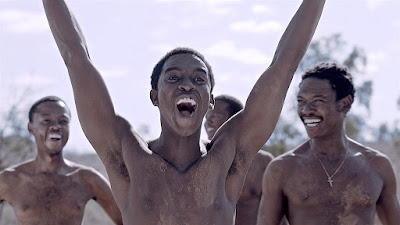KALUSHI COULD BE A START OF A BETTER INDUSTRY IF WE TRY
 |
| Scene from film Kalushi actors Jafta Mamabolo, Thabo Malema and Wandile Nzuza. PICTURE: SUPPLIED. |
THIS week marked a celebration for
movie Kalushi which on Human Rights’s
Day made R254 452 at Box Office which grossed a total of R1 614 773 with
28 755 attendances within 12 days of hitting local cinemas.
The film directed by Mandla Dube, is
a biopic of the life of struggle activist Solomon Kalushi Mahlangu which has taken nearly nine years to complete and
tells the story of Kalushi (played
by Thabo Rametsi) whose life was ended at the age of 23 by execution during the
height of apartheid.
 |
| Actor Thabo Rametsi as Kalushi. |
Within seven days
at the cinema it had made R783 877, as it’s actors Rametsi, Thabo Malema,
Pearl Thusi and more have been campaigning on social media rallying locals to go watch the film, and although it’s working the film could find itself
being removed at several cinemas if it doesn’t make the top five highest grossing
films by the end of this week.
And this is an
ongoing problem in South African film distribution, a fight many filmmakers know such as Akin Omotoso, whose film Tell MeSweet Something was booted off box office from some suburban cinemas when
it didn’t make the top tier of most watched films at the cinemas.
In 2015, SundayTimes reported a story about the plight local films face while the Afrikaans
genres seemed to soar in numbers at cinemas and various issues seemed evident
when looking at the demographics and the issues of why audiences don’t watch
local films, can’t access them and why local films can make as little to
nothing at cinemas.
One issue
prevalent to local films was the access to cinemas from townships and rural areas which
actress Florence Masebe who starred in Vhenda film Elelwani - which only raked inR290 897 at Box Office as reported by National Film and Video Foundationin 2014 - raised and continues to champion.
“Every culture likes watching films in their own languages and about
their own cultures, but there are not enough cinemas. There are many other
issues, including that funders need to also fund for the marketing and
distribution of the film, not just the production aspect.
“Filmmakers shouldn’t have to mortgage their homes and use their
children’s education funds to ensure their
films are a success,” she said.
Another issue was
the fact that certain races were supporting each other when it came to
supporting each other's productions as they fund and promote each other to
ensure their films do better than others.
Film director Sara
Blecher, who has worked on Otelo Burning,
Surfing Soweto and Ayanda, said the success of
Afrikaans-language films could
be attributed to filmmakers who had been “developing a consistent vision to
uplifting their films”.
“The
Afrikaans market is a small margin compared to other languages in this country,
but they believe and support the enrichment and preservation of their culture
and language.
“They
get private funders who are also willing to keep the language strong.
“Filmmakers
should all engage each other to unpack and learn from the Afrikaans market just
where they could be going wrong and how they, too, can further their films ,” said Blecher.
Rametsi who is passionate on pushing his film as far as it can go,
said he had attempted to raise some issues on the distributors of Kalushi, said
he “got into trouble” when he raised the geographical distribution issues of
the film.
Instead
the young filmstar urged his followers “who cant access Kalushi in your areas or can’t afford the cinema price
please tweet” as he said “the gatekeepers need to see this”.
“So #Kalushi isn't
doing as well at the theatres. Movies for Indian audience and Afrikaans
audience are doing better. We need our people,” wrote Rametsi on Tuesday.
And he got
massive response:
“Take our movies to our people. If you
have to take 2 taxis just to get to the movie theatre, the overall cost gets
too much,” tweeted one Mzwandile Jula.
Buhle Mbonambi
even suggested: “@ThaboRametsi I know there's virtually no marketing budget- but what the
black churches did for #HiddenFigures, might
work for #Kalushi”.
IN MY OPINION:
There a many huddles for black films and filmmakers.
They are faced with battles from the moment they decided to go into filmmaking or even consider starting to pen a film in hopes to tell a local story. The funding being the first biggest burden on our arts - all forms of funding come with gruelling red tape be it from NFVF, National Empowerment Fund, The Department of Trade and Industry, the national Lottery Commission, IDC and Gauteng and KwaZulu-Natal film commissions.
Perhaps this may be the only way
local black films can succeed, taking back our content to the grass root levels where films are viewed on projectors in halls, churches and schools.
There also needs to need to be a united front from the entertainment industry where fellow actors and actresses rally on social media for all the black arts whether they are part of it or not. This lack of unity and is what will also land black entertainers into even dire situations.
Through this fight however, we need to bare in mind is that cinemas are run as a business so while we
complain about prices, they also wondering how they should make a profit from
screening films and trust me they are not about to move a mountain for one production, but if all productions rallied together this be a wake up call for the productions.
We can do this, if we stand together... Local films matter!



Comments